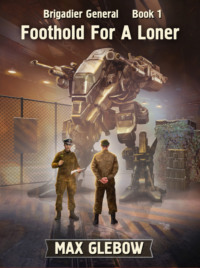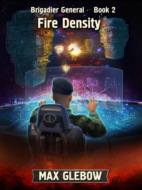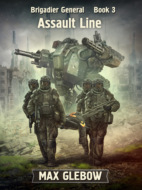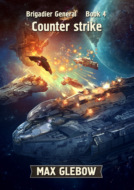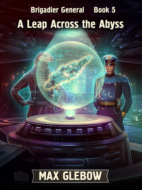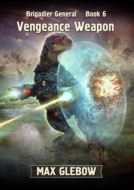Kitobni o'qish: «Foothold For A Loner»
Prologue
“Report to my office.” Major Weber’s voice resounded in the radio communicator of Lieutenant Alexey Egoroff, who was training with his group at the firing range simulator. The new missile system, Storm-M, had just been deployed, but they were still trying to master these new weapons during the downtime between military operations, and so they continued to go on missions with the usual guns.
“Yes, Sir, in five minutes. I’m at the shooting range,” replied Alexey, breaking off the training exercise with regret. “Continue without me. Ivan, you’re in charge. Practice shooting at lightly armored targets a few more times. When I return we’ll continue training how to fight in settled areas.”
“Yes, we’ll do that, Commander,” answered Ivan without any additional questions.
Major Weber’s headquarters was located about 100 meters from the bunker dug into the earth. While Alexey was on his way he had enough time to decide that it was necessary to remind the Major that his group was no longer complete. Sergeant Trenton had been wounded during a previous operation; hence, their team had lost one of its most skilled universal commandos. That was common.
As a rule, casualty rates were highest among these top paratroopers because they often had to cover their group’s retreat in extreme situations. It was truly a miracle that Trenton, even though wounded, had managed to lead the adversary on a wild goose chase. More than that, he outran his pursuers and reached the meeting point. Usually, tricks like that didn’t work, but still, it was clear that he wouldn’t soon return to the game.
The Major’s office door was open.
“Permission to enter, Major?” asked Alexey while appearing in the doorway.
“Come in and close the door. New orders just came through. Sit down.” The Major touched his finger to the screen of his tablet and over the table appeared a holographic map of some semi-desert region with sandy hills, rather shallow ravines and couple of small and partly ruined buildings.
“This is the western edge of the New Wasteland. No Man’s Land: 350 kilometers from the area under our control. Our recon fly-car was shot down there. It was carrying our guys on their way back from a successful raid. Presumably, it was a quarg interceptor that shot down the fly-car. We can only presume this since there’s been practically no communication. A part of the group managed to survive, however. At least, we got their signal. They’re somewhere here now,” said the Major, highlighting in red the region of forthcoming searches on the map.
“We got to retrieve our recon men. They found something very important there. Since this isn’t a standard rescue operation two interceptors will accompany you. You start in 20 minutes. Is the mission clear?”
“Yes, Major, Sir! But I’d like to remind you that I’m undermanned and of our two highly skilled universal commandos we currently only have one. Trenton was wounded; he’s in the hospital and it looks like for a long time.”
“I remember, but it’s not that easy to find a qualified professional in this neck of the woods. However, I’ve got a man for this mission, but I don’t know if you’ll be happy. His fly-car arrives in several minutes.”
“But, Major, Sir, how can I take a totally unknown fighting man on a mission? Without a sense of unit cohesion, and without getting him acquainted with the details he’ll be a burden even if well-trained. And that remains to be seen.”
“You don't think I know that? But the colonel wouldn’t listen. He just made a reference to orders from the top and said to follow it. This means you’ll have to sort things out. Flying time is about 40 minutes, enough to get a closer look at the cadet and clarify his combat role. I’ll transfer his file to your tablet.
“A cadet? Is this a joke, Major, Sir?”
“Not at all, Lieutenant, it’s an order. Do I have to put it in writing? The cadet is seconded to your group for one mission. Probably for two or three, depending on the results. That’s all. Carry out the order, Lieutenant!”
“Yes, Major, Sir!”
Alexey left the headquarters confused and shocked. One can expect some pretty appalling things from the top brass, but this time… A cadet! Had it ever happened before: a cadet in a special forces team sent on a mission to No Man’s Land? Do they want him to be killed? And the entire group as well?
Despite these grim thoughts, Alexey followed the standard mission preparation plan: let the guys know the time and place for the group gathering, as well as the requirements for gear and equipment. Next, he was going to get his own equipment, but then someone called out.
“Lieutenant, Sir, may I address you?”
Alexey turned around. He was approached by a tall and very young guy in a cadet’s uniform on whose sleeve was only one single bar, to Alexey’s dismay. The cadet! Nevertheless, he stopped and turned to face the man approaching him.
“Go ahead.”
“Lieutenant, Sir. Cadet Igor Lavroff reporting as ordered.”
Alexey looked his new subordinate over more attentively and understood that the surprises were just beginning today. The first thing that caught his eye was a holster with a Grot automatic handgun; that was quite a rare model and certainly not for cadets. Then he looked at the cadet’s military decorations. Beside the emblem of the Planetary Commando Academy there were Expert and Unique Specialist badges. That didn’t at all fit into the usual pattern. These two badges were rarely awarded and Alexey had never even seen junior officers with them.
The Expert badge was, as a rule, awarded to a unit commander who had secured a victory against the worst possible odds in a major battle. What on earth could a cadet do to be awarded this – that was clearly beyond all imagination. The Unique Specialist badge signified that the person possessed some very important and rare skill that allowed him to earn a victory for at least a regiment, or even for a division. Just what kind of battle was this so that the division’s victory depended upon a cadet’s fighting ability?
Alexey looked to the left side of the cadet’s jacket which had a qualification tab. The stripe designating the cadet’s theoretical background was gleaming green just a little more than one third of its length, which was only to be expected from a freshman. It should gleam in its entirety so the cadet could become an officer. The stripe designating combat experience as a soldier and/or sergeant was also necessary to become an officer; it was black, which didn’t surprise Alexey at all. That meant this guy hadn’t served in the army before entering the Academy, and as a rule freshmen are not sent into battle. But this freshman appeared to have officer’s combat experience in abundance.
His score was more than 16,000 while the usual one for a graduate was around 100. And that was five times as much as Alexey had himself. This could only raise questions. Besides, the cadet had battle experience in senior command positions that was absolutely unexplainable. So it seemed that the cadet had fought a lot and successfully, but all the time performing officers’ duties! It became clear that’s how he managed to get this gun. With an Expert badge one had a right to choose his own weapons and equipment. Though, it was the same with the Unique Specialist badge. And that badge meant a lot of other nice perks as well. But going on a mission with a gun, even with one like this, was kind of…
“Cadet, is it all you have for a weapon?” Alexey glanced at the holster.
“No, Lieutenant, Sir. Most of my equipment is in my fly-car. “
That was one more peculiarity. Cadets, even the best, are not supposed to have individual fly-cars. But this was insignificant when compared with the rest.
“Well, Cadet, time marches onward. Take your things and go to the tarmac, third sector, in ten minutes. Don’t get into the landing ship. Wait for me. I’ll introduce you to the group. While on board we’ll discuss everything in detail and check your gear. Welcome to my detachment.”
“Thank you, Lieutenant, Sir. May I have permission to go?”
“Yes, go.”
The Cadet quickly left for the tarmac, and Alexey hurried to get ready. Now he had even more unanswered questions. Who the hell is this guy who doesn’t have to abide by the usual introduction procedure of a novice to the team? Moreover, a cadet. And yet, he is very advanced judging by his military decorations and experience. That’s nonsense! One can’t do that – even a very, very tough cadet. Stop. Enough. I’m gonna have to read his file. But when? Not now, that’s for sure.
When Alexey reached the tarmac’s third sector Lavroff was waiting for him. And he looked rather unusual. To begin with he had chosen a very exotic modification of the Storm complex to be his primary weapon. Normally, Storm was intended for heavy infantry. It was very heavy, and to use it effectively required an enhanced exoskeleton that was part of a heavy infantry rig and combined with strong armor. But this huge mass restricted mobility and shortened the combat time while using a standard battery. This is why Alexey’s guys, for whom secrecy and mobility played a crucial role, had never even thought about using it.
The Cadet, however, clearly understood that so much mass will negatively effect his mobility, which is why all his exoskeleton’s armor plates with heavy infantry gear were replaced by light composite protection. This allowed to reduce the overall mass and dimensions to the extent that you could install a second battery pack and an additional box for ammo. That didn’t seem to be superfluous because the Storm, which includes a 30 mm automatic gun, long-barreled sniper rifle and a rotary machine-gun, had a great appetite for ammo. At the same time, the exoskeleton’s lifting capacity was large enough to provide good mobility.
After carefully watching his team’s new member for a while, Alexey said to the Cadet with a tint of doubt in his voice:
“Well, move around a bit. Jump, show me a change of positions.”
“Yes, Sir,” answered Lavroff, jumping up three meters almost instantly. Having hit the ground he rolled 20 meters to the left, and he was almost immediately under the technical service car, pointing the barrel of his automatic weapon toward an imagined enemy.
“Hmmm, that’s enough.” Alexey’s voice sounded neutral, but any of his team’s older members understood that the Lieutenant at least wasn’t disappointed by what he’d just seen. “We’ll see how that's gonna look in real combat. Let’s get on board.”
When Alexey and his new subordinate ascended the dropship’s ramp into the drop bay, the rest of the team was already there. Having glanced at the novice, they turned their puzzled gazes to their commanding officer.
“This is Cadet Igor Lavroff, who is replacing Trenton,” Alexey calmly informed his soldiers, immediately spotting the bewilderment and confusion on their faces. Ivan, who was senior in rank only after Alexey, expressed what all of them felt:
“A cadet? Did we hear that right, commander?”
“You heard it right.”
“But…”
“We got an order and can’t discuss it. Lavroff is going with us.”
“Yes, Lieutenant, Sir.” Ivan’s answer sounded extremely formal, which made it perfectly clear that the members of the group still didn’t understand how that could be possible. “Let me ask a question, Sir.”
“No, Ivan. I see all your questions written on your face and I don’t have any answers. We must take off. I’ll introduce him once we get under way. Cadet, take your place opposite the sergeant,” said Alexey, nodding towards Ivan.
Literally a minute later the ramp went up, and the turbines started buzzing. The dropship took off from the tarmac and set a course for the destination. The escorting interceptors caught up with the ship almost immediately.
“So, Cadet, across from you is Sergeant Ivan Kelt. Deputy commander and pathfinder. To Ivan’s right is Private First Class John Zeit, sniper. Next, Private Anton Gnezdoff, a universal commando and your colleague. On my right is Private First Class Kay Shefferson, communications and equipment specialist. And, finally, Private First Class Ilia Kopytoff, physician. Now, about our mission. There’s already a map on your tablets with our destination indicated.
The border of the search area is marked red. A fly-car with our long-range recon patrol was shot down there. We have to find the survivors, provide necessary assistance and evacuate them. Just as usual, we’ll disembark, comb the area thoroughly, find our guys, grab them and get out of there. The meeting point to board the dropship is on the opposite border of the search area. Any questions?”
“May I speak, Commander?”
“I’m listening, Anton.”
“Who will be the hen to fuss over this chick of a cadet? With his crazy outfit and his cannons he’ll give us away and slow us down. Besides, he doesn’t know our code signals and tactics. We’d have to give him a lot of extra voice commands, and you know how that goes with our communication systems.”
Alexey looked at Lavroff, at how he’d react. But the cadet sat perfectly still and waited for the Lieutenant to answer. He was clearly interested to hear the answer despite the sarcastic question. Alexey rubbed his chin and looked at Anton.
“I’ve already told Ivan that I’ve got no answers to many questions. We’ll show our code signals to the cadet now, and as for the danger of giving us away we’ll find that out only on site. I hope Lavroff won’t need any special care.”
“Where did he get this equipment from? Who chose it for him? It doesn’t fit in well with the bulk of our equipment,” asked Shefferson.
“Cadet, explain,” said Alexey.
“Yes, Lieutenant, Sir. I chose and prepared this equipment myself. Since I didn’t have the chance to match it with the group’s armaments I assumed it has to meet the basic task of a universal commando, namely to provide fire support for the group and, if necessary, provide cover for a withdrawal. Besides, I focused on the probability of acting alone, hence I maximized mobility, ammunition and power availability at the expense of protection.”
“You did it yourself? Who trusted you with this? What about camouflage? You’ve got a huge ‘barn’ with cannons. How are you going to move discreetly?”
“Unfortunately, camouflage only protects from visual detection. And so I had to give it up, as I did with my protection system. But my gear is well protected from electronic surveillance equipment: there’s a special scattering layer on the armor and a built-in electronic warfare device with an additional noise and decoy generator that can be adjusted so it won’t bother our guys.”
“Stop!” Lieutenant raised his arm in order to prevent new questions. “We don’t have time. We must brief Lavroff on our group’s tactics. Look here, cadet, and try to remember everything the first time I say it…”
* * *
Trouble started the moment they entered the No Man’s Zone. The escorting interceptor that had flown ahead to do recon disappeared from the scanners. Generally, there was nothing unusual in that. The electronic warfare systems used by both sides in the conflict were much more advanced than the communication equipment, and so both faced awful communications. The interceptor, however, didn’t return at the appointed time. Still, the group had its orders, and their ship continued towards the missing plane’s last known location.
And this is where the enemy hit them.
The interceptor had been attacked by a ground-to-air missile – the dropship pilot’s voice could be heard in Alexey’s helmet. The Lieutenant noticed the interceptor make a sharp evasive anti-missile maneuver, but then it disappeared out of sight. There was no sound of an explosion.
“He evaded it,” said the pilot. “He’s lucky. Stop! One more missile. And one more…”
A siren’s scream let the group know that their dropship was also under attack. The large and slow aircraft, unlike the interceptor, couldn’t evade a missile, and the interceptor couldn’t help because that pilot had his own problems.
The dropship’s pilot shot off a bunch of thermal and radio-location decoys, and directed his sluggish craft downward. But the missile didn’t fall for the trick. The siren continued to scream, and on top of that was the loud clanking of the ramp going down and the noise of incoming air.
“Jump, Lieutenant!” the pilot was almost shouting. “A ground-to-air missile is gonna hit us in about 20 seconds.”
Alexey saw the missile coming from the back; its contrail clearly visible in the opening above the ramp that was drawn down. The missile’s nose could already be seen. It approached steadily despite the decoys and the anti-missile system. Alexey understood they weren’t going to make it and jumping from that height would be suicide. But then something heavy struck him on his helmet and he couldn’t even see straight. He noticed it was the Cadet’s armored elbow, and then a wild roar filled the compartment. The buzzing of the rotary machine-gun was unbearable, even with a helmet on, though Alexey didn’t have time to pull down his visor. This hellish sound continued for just under a second. Then it all went quiet except the rattling of hundreds of cartridge cases rolling around the bay floor. Alexey heard them as if through a layer of cotton wool. The siren ceased and the ramp started closing. The dropship descended at full speed.
“Lieutenant, Sir,” the pilot was still in shock, his voice trembling, “Your soldier brought down the missile. That’s impossible, but he did it. We’re making an emergency landing. The interceptor wasn't so lucky: he had almost evaded the missile when it was blown up remotely, and pieces from it hit his plane and the pilot had to return to base. It remains to be seen if he can do so.”
Alexey’s gaze focused on the cadet who had fired while on his knee and now he was getting up to return to his seat.
“How did you do it, Cadet?” Ivan’s voice sounded more firmly than their ship’s pilot, and it seemed he had been in similar situations more than once. Alexey always liked his calm self-restraint, and he turned to the Cadet again, concerned with the answer no less than the Sergeant.
Lavroff sat down on his seat, secured his equipment, which was obviously not superfluous before the emergency landing as Alexey remarked to himself. Then he raised his helmet visor, which had been pulled down in time, and explained:
“My helmet’s data processing system has a special co-processor for calculation of deflection that’s used while firing on quick moving targets, and it’s interfaced with the visual recognition system. Then it’s connected to the exoskeleton’s pseudo muscular system that helps to aim the machine gun or the cannon. I just took up a position for shooting, identified the target, chose the weapon and pointed the machine gun at the missile. The equipment did the rest.”
“Have never heard about gear like that before…” began Shefferson, but he had no time to finish his sentence. The dropship touched down and it shook. There was no time for talking. The ramp went down abruptly and the landing started.
Chapter 1
Long before that…
“So, Colonel, how do you feel?” there was clearly tension in General Clay’s voice.
“Just the same for now, General, Sir,” I smiled joylessly. “The doctor thinks there’s a bit more than one month of normal life left for me. Then my brain will start deteriorating at an increasing rate. As far as I understand nothing can be done.”
“Hmmm,” the General clearly struggled for words, but then gave up and sat down on the bed's edge. “Let’s put aside ranks. You’re right, Dean. They don’t know what to do. This is a new weapon. The enemy used it for the first time. Those who were at the epicenter saw their brains fried and fail immediately, and irreversibly. Your troop carrier just nicked the edge. At first, no one had any symptoms at all, some light-headedness at the most, but…”
“Clay,” addressing the General without ranks felt more appropriate. I’ve got a request…”
“Go ahead. I can deal with it.”
“I’ll be fine for one more month. I saw the guys from the Hawk while I was on the rescue operation after the attack. I know what awaits me. I don’t want to die slowly in a hospital like a vegetable. I’m not just a planetary commando. I’ve got experience commanding a squad of assault robots. A major counter-offensive was launched in the 17th sector. Let me land with the first wave of commandos on one of the planets occupied by the toads. I won’t be able to command any human, that’s understood, and I’d never ask men to follow me to certain death. But to lead ten autonomous assault robots and to rage one last time – that’s another story. A warrior with no fear of death can save many soldiers.”
My words got the general thinking. The look on his face didn’t change, but there was a gleam of understanding in his eyes and, as it seemed to me, approval.
“Fair enough. Although your case is unusual. I’m not 100 percent sure, but I’ll do my best to make it happen.”
* * *
For three days I was left alone except for the standard daily check-ups and medical procedures that were unavoidable for patients at the hospital. Doctors averted their eyes from me, and so everything became quite clear. On the fourth day the General came again.
“Get dressed. Quit warming up your ass here,” the harsh words were an attempt to cover the awkwardness that Clay felt. “There’s no point for a brigadier general to hang around here in the rear ward when his army has been assaulting Delta Kirsani for the second day already.”
“I don’t understand,” I looked at the General raising my eyebrow.
“Ain’t nothing difficult to understand. For the recent operation you've been promoted to brigadier general earlier than planned. My congratulations, Sir. At the same time your new insignia is an extra headache for me. Your request has been considered in Fleet Headquarters. The Imperial Technological Consortium has just delivered 10 brand-new assault robots to the Armed Forces. They have to face testing under the most difficult conditions. This task was entrusted to you by headquarters. I had to rack my brains on how to appoint a brigadier general to a lieutenant’s post and not to seem as if I was fucking with the brains of all the captains, majors and colonels who will be your immediate supervisors.”
“So, you managed to do it, General, Sir?” I gave him a little smile.
“What else was I supposed to do? Here’s the deal: you and your robots will form a strike platoon reporting directly to me as before. These assault robots are new and a secret weapon, so they’re not to be tested on the level of a battalion or even a regiment. I’ll wait for you at the flyers’ lot near the main entrance. The hospital staff has been notified. Your new uniform will be brought here.”
I won’t say that I was very happy to know what lay ahead, but I was relieved. After all, death in battle – that’s honorable for a soldier, as well as for a general. It’s much better than dying in a hospital, slobbering and wetting one’s bed.
* * *
Nevertheless, I couldn’t get everything done without messing with the minds of some officers. When I arrived to take command of my strike platoon I saw that the assault robots, which were still in their shipment packaging, were stored in a separate hangar under the guard of two boarding robots. I had to ask the technicians for assistance. Despite my rank those in charge of the logistic base clearly had enough of their own concerns, and had no time to bow and scrape before a visiting general, who with all due respect, is neither their commander nor inspector. I had a job to do, so I tended to it myself. The head of the local technical service, who appeared to be an elderly major, was extremely surprised to see a commando general at his office. Rather amused by the situation and keeping a straight face, I was the first to salute the major who came towards me from behind his desk.
“Major, Sir, this is Brigadier General Dean reporting. I arrived to get 10 Quantum-C assault robots and a small Cuirassier troop transport. I need your assistance to make the machines combat-ready.”
“Eh… General, Sir.” The head of technical service was clearly dumbfounded. “Why have you come in person? You’d be better off sending the robots’ pilot, and we’d give him everything as best as we could. Or his company commander could come in case of the need for a special inspection.”
“I’m the pilot, Major.”
“You? Eh… I beg your pardon, General, Sir, that’s probably not my business, but it’s very unusual. In my many years I’ve never seen a brigadier general in command of a platoon of assault robots… Not even a colonel, not to sound too…”
“Just relax, Major. There's a first time for everything,” I smiled. “Just get them prepared, and I won’t inconvenience you any more with my presence.”
“We’ll do that in a jiffy, rest assured, General, Sir. Probably four hours, tops. I've already called the guys to the 16th hangar. I’ll oversee everything personally.”
“I have no doubt, Major. No doubt.”
Delta Kirsani greeted me with the commotion following a major battle that had ended. The toads had dug in very well here. Everybody calls them ‘toads’. Our enemies have another name, an official one, but after seeing these oversized frogs at least once you could only call them ‘toads.’ They’re just toads.
Within a year after our fleet had left this binary star system the toads gained a foothold on all three planets that supported life, deployed orbital defense systems and built many bases within the asteroid belt. That's not to mention numerous minefields and automatic gun-missile platforms at the most strategic directions. Also, a fleet was stationed here. How could they manage without it? Orbital fortresses alone can’t provide flexibility for a proper defense.
Our side took this matter seriously, and I can’t even imagine how many star systems were deprived of additional forces in order to build this invasion armada. No less than 10 aircraft carriers, 14 battleships, nearly 100 cruisers, as well as a host of destroyers and corvettes. All this power came pounding down on the toads, and after busting through the mines and pilotless battle stations they hit the orbital fortresses over the fourth planet. No orbital defense could withstand such an assault. The toads’ mobile forces did their best to hold onto their battle positions above the planet, plugging holes created by destroyed fortresses, but that didn’t last long. Once our fleet had finished off the enemy orbiting the system’s main planet, it proceeded to the neighboring planets and by now there were no enemies left in the space.
That was a glorious victory but a very bloody and costly one. You couldn’t look at the victorious ships without choking up: pierced boards, gun turrets crushed by enormous explosions, gnarled and twisted flight decks. And these were the survivors – less than a half of the forces had arrived here. The toads are able to fight hard even outmatched, even when caught unawares…
Well, the orbital defense had been neutralized. It was now up to the commandos.
I piloted the Cuirassier myself. Essentially, this small troop transport was designed to be steered by the pilot of assault robots aboard. The Cuirassier was created for intersystem flights and for landing troops directly on a planet surface under favorable conditions. It can’t make a hyper-jump, so I arrived to this system on the outer hangar of a large troop carrier that transported heavy assault tanks. Its captain wasn’t at all happy to make a center-of-gravity recalculation before the jump and nearly told me to bug off, but then he compared his shoulder straps to those of the ballsy Cuirassier pilot and refrained from any objections.
After emerging from hyper-jump I reported to General Clay about my arrival. The first wave of commandos had already left for the fourth planet, and General Clay was too busy to say the least, but he nevertheless found the time and showed me the waiting area. The guys were clearing a foothold for a heavy equipment landing and the General ordered to be ready to join the commandos in an hour or two.
That landing order came earlier than I expected. Besides the coordinates for the landing point and short notification of safe passage, there was also Clay’s comment: “Don't you dare launch any suicidal attacks. Remember the mission. You may sacrifice all your robots but give them a chance to fight well, and so that your module has a chance to send a report to the Technological Consortium”.
In general, I understood that. When translated into normal language it means the following: “Don’t hurry your journey to the afterlife. I still need you here, at least until the mission ends. Or almost to the end.”
The landing passed without any surprises. When I landed on the surface I saw the price that the first wave paid to provide me with a smooth landing. The landing point was already cleared, but as far as the eye could see the entire area was covered with fragments of fighting vehicles, still emitting smoke. Many of the toads’ tanks were still burning, but then things got really hard for us. If things continued like this then the first wave would be drained in a couple of hours.
There was a loud rumble of powerful planetary engines. The first carriers with troops and equipment started their final approach.
On the second day I realized that we were really bogged down. Our troops couldn’t expand their foothold no matter how hard they tried. The toads unhesitatingly continued to send new forces into combat that had been hiding in well-disguised underground shelters. I managed to help stop an enemy tank breakthrough and beat back an airstrike of atmospheric attack planes. The hotshots from the Imperial Technological Consortium clearly knew their stuff.
My assault robots acted above and beyond my expectations, compared to the previous models. I only coordinated their actions while sitting in my heavily armored command module that was really a walking tank similar to my robots but almost twice as massive. My robots did a fine job with aerial targets. Flaming debris from three toad assault planes fell to the ground battered by explosions. The remaining two planes that sustained damage couldn’t provide precision fire and hurriedly retreated by hedgehopping over the nearby forest.
